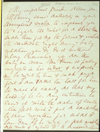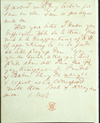Mahatma Letter No. 36: Difference between revisions
No edit summary |
Pablo Sender (talk | contribs) |
||
| (2 intermediate revisions by 2 users not shown) | |||
| Line 38: | Line 38: | ||
{{Col-break|width=30%}} | {{Col-break|width=30%}} | ||
'''NOTES:''' | '''NOTES:''' | ||
* '''Mella''' (Hindi: ''melā'') means "meeting," "assembly." | |||
* '''Puja''' is a [[Sanskrit]] word meaning "reverence, honour, adoration, or worship." | * '''Puja''' is a [[Sanskrit]] word meaning "reverence, honour, adoration, or worship." | ||
| Line 89: | Line 90: | ||
[[it:Lettera dei Mahatma n° 36]] | [[it:Lettera dei Mahatma n° 36]] | ||
[[es:Carta de los Mahatmas No. 36]] | |||
Latest revision as of 22:46, 14 June 2021
| Quick Facts | |
|---|---|
| People involved | |
| Written by: | Morya |
| Received by: | A. P. Sinnett |
| Sent via: | unknown |
| Dates | |
| Written on: | unknown |
| Received on: | January 1882 - (Incorrect date. See below) |
| Other dates: | unknown |
| Places | |
| Sent from: | unknown |
| Received at: | Allahabad, India |
| Via: | unknown |
This is Letter No. 36 in The Mahatma Letters to A. P. Sinnett, 4th chronological edition. It also corresponds to Letter No. 36 in Barker numbering. See below for Context and background.
< Prev letter chrono
Next letter chrono >
< Prev letter Barker
Next letter Barker >
This letter is most probably misdated and should be read before Mahatma Letter No. 30. See below.
Page 1 transcription, image, and notes
|
Received about January, 1882. My impatient friend — allow me, as one having some authority in your theosophical mella, to empower you to "ignore the rules" for a short time. Make them fill up the forms and initiate the candidates right away. Only whatever you do, do it without delay. Remember, you are the only one now. Mr. Hume is fully engrossed in his index and expects me to write to him and make puja first. I am rather too tall for him to reach so easily as that my head — if he has any intention to cover it with the ashes of contrition. Nor will I put a sack-cloth to show repentance for what I have done. If he writes and puts questions all well and good I'll answer them |
NOTES:
|
Page 2
|
if not — I will keep my lectures for someone else. Time is no object with me. Had your letter. I know your difficulties. Will see to them. Great will be the disappointment of K.H. if upon returning to us he finds so little progress done. You — you are sincere, others — put their pride above all. Then those Prayag theosophists — the Pundits and Babus! They do naught and expect us to correspond with them. Fools and arrogant men. |
NOTES: |
Context and background
A. P. Sinnett had written to H. P. Blavatsky about initiating some people into the Theosophical Society—whether in Allahabad or Simla is not clear—probably the latter, since the group there had been newly organized. On November 2, 1881 (LBS# 7), HPB answers saying: "What can I say about initiating the Fellows immediately? Of course you ought to initiate them and send their applications to me, not to Olcott, for I represent him now here. . . . As soon as I see the Boss I will ask his permission." Mahatma Letter No. 36 seems to be a direct response from Master M. to Sinnett's question about initiating the new members immediately. In addition, the reference in Mahatma Letter No. 30 (written on November 4): "I wrote to Sinnett my opinion on the Allahabad theosophists" seems to refer to the present letter (No. 36). This letter, therefore, should have been written between November 2 and 3, 1881. In a personal communication, Daniel Caldwell suggests that this letter may have been added by Master M. to the answer that HPB mailed Sinnett on November 2.
Physical description of letter
The original is in the British Library, Folio 2. According to George Linton and Virginia Hanson, the letter was written:
On small sized sheets of heavy white paper in dark red ink, on both sides in M script.[1]
Publication history
Commentary about this letter
Notes
- ↑ George E. Linton and Virginia Hanson, eds., Readers Guide to The Mahatma Letters to A. P. Sinnett (Adyar, Chennai, India: Theosophical Publishing House, 1972), 86.

